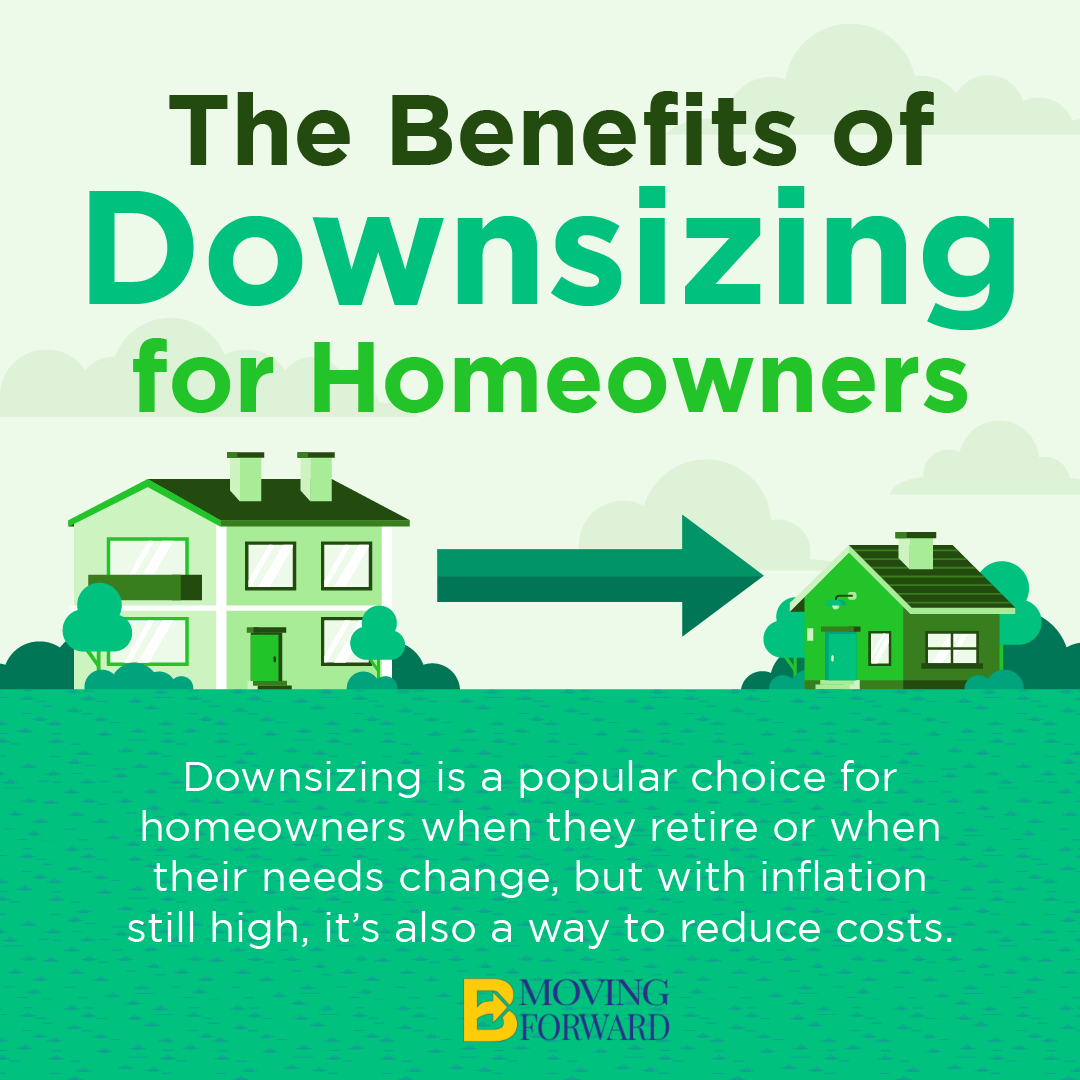Should I Downsize My House
Let’s discuss the pros and cons to answer your question, [...]
Let’s discuss the pros and cons to answer your question, “Should I downsize my house?” The correct answer to this question depends upon your priorities, future goals, and ideal lifestyle.
Typically, when speaking with our clients, they have two primary concerns.
#1 is “I want to downsize, but I don’t know where I would go and if I would profit from the move.”
#2 is related, “We have so much stuff that it seems like it’s going to be a massive effort to make the move. Will the effort needed be worth it?”
#3 We like our home and location. We don’t need this much house anymore. It’s more than what we would like to take care of. We’d love to find a smaller home in a similar location with a profit, but we don’t know if that’s even possible.
To help answer these primary questions, let’s review the pros and cons of downsizing your home.
We’ll start with the pros of downsizing first.
Benefits of Downsizing Your Home
Are you feeling overwhelmed by the never-ending demands of maintaining a large home? Do you dream of a simpler and more fulfilling lifestyle? It might be time to consider downsizing your home.
In today’s fast-paced world, many people are discovering the benefits of downsizing to maximize their happiness. Reducing a large house’s physical and financial burdens allows you to free up time and resources to focus on what truly matters.
Downsizing offers numerous advantages, from lower utility and maintenance costs to reduced clutter and stress. It allows you to simplify your life and prioritize experiences over possessions. With a smaller home, you’ll have more time and energy to pursue your passions, spend quality time with loved ones, and engage in activities that bring you joy.
Whether you are an empty nester, a retiree, or simply seeking a change, downsizing might be the key to unlocking a more fulfilling and satisfying lifestyle. Discover the transformative power of a smaller home and take the first step towards maximizing your happiness today.
We’d love to help you decide if you should downsize or not. Schedule your consultation – we’ll review your unique details to help determine the best strategy to obtain your highest priorities.
[eltd_button size=”medium” type=”solid” text=”Schedule Your Consultation” custom_class=”” icon_pack=”font_awesome” fa_icon=”” link=”https://bmovingforward.com/schedule/” target=”_self” color=”ffcc00″ hover_color=”” background_color=”” hover_background_color=”” border_color=”” hover_border_color=”” font_size=”” font_weight=”” margin=””]
Psychological Benefits of Downsizing
Downsizing your home can have a profound impact on your mental well-being. Living in a large house can make you feel overwhelmed and stressed as you try to keep up with the never-ending maintenance and cleaning tasks. By downsizing, you can create a more manageable living space that promotes a sense of calm and relaxation.
A smaller home encourages a more minimalist lifestyle, proven to improve mental health. Clutter can be a source of anxiety and can make it difficult to focus and relax. When you downsize, you must evaluate your belongings and keep only what brings you joy. This decluttering process can be incredibly liberating and help create a more peaceful and organized living environment.
Additionally, downsizing allows you to simplify your life and prioritize experiences and relationships over material possessions. With fewer rooms to clean and maintain, you’ll have more time and energy to invest in activities that bring you joy and spend quality time with loved ones. This shift in focus can lead to a greater sense of fulfillment and overall happiness.
Financial Benefits of Downsizing
One of the most apparent benefits of downsizing your home is the potential for significant cost savings. A smaller home typically has lower mortgage payments, property taxes, and insurance premiums. Additionally, utility bills are often reduced due to the decreased square footage of the house.
By downsizing, you can free up a substantial amount of money that can be used for other purposes. Whether investing, increasing travel, or redirecting funds toward retirement savings, downsizing can provide financial flexibility and security.
Furthermore, downsizing can help you avoid unnecessary debt or financial strain. A smaller home requires less maintenance and repairs, saving you money in the long run. Additionally, downsizing can prevent overspending on furniture and decor for a larger space, allowing you to make more intentional and sustainable purchasing decisions.
Simplifying Your Life Through Downsizing
In our consumer-driven society, it’s easy to get caught up in the pursuit of material possessions. However, studies have shown that experiences, not things, truly bring us happiness. Downsizing your home can help you shift your focus towards what truly matters in life.
In addition to reducing physical clutter, downsizing can help simplify your schedule and commitments. With a smaller home, you’ll have less space to clean and maintain, freeing up time for the activities and hobbies that bring you joy. You’ll have fewer financial obligations, allowing you to work less and spend more time with loved ones or pursue your passions.
Cons of downsizing – When is the wrong time to downsize my home?
While downsizing a home can be a beneficial and strategic move for many people, there are situations where it might be considered a bad idea. Here are some scenarios in which downsizing might not be advisable:
Unfavorable Market Conditions: If you sell your current home during a market downturn or in an area with declining property values, downsizing might not yield the financial benefits you expect.
Emotional Attachment: Downsizing might be challenging if you have a solid emotional attachment to your current home. Emotional considerations, especially if tied to memories or sentimental value, can outweigh the practical benefits of downsizing.
Limited Financial Gains: If the financial gains from downsizing are minimal or won’t significantly improve your financial situation, it might not be worth the effort. Consider transaction costs, moving expenses, and potential lifestyle changes.
Unpredictable Life Changes: If you anticipate significant life changes, such as a growing family, returning children, or uncertain future housing needs, downsizing might not be the best choice. Ensure that your new home accommodates potential changes.
Health Considerations: If you have health issues or mobility concerns, moving to a smaller home with different layouts or features might not be suitable. Consider your current and future health needs when deciding on downsizing.
Inadequate Planning: Downsizing requires careful planning. If you haven’t thoroughly considered your needs, lifestyle, and the logistics of the move, it can lead to dissatisfaction and inconvenience.
Limited Availability of Smaller Homes: In some areas, finding a suitable smaller home that meets your needs and preferences may be challenging. If the available options don’t align with your requirements, downsizing might not be practical.
Ultimately, the decision to downsize should be based on carefully evaluating your current and future goals, financial situation, and lifestyle preferences. It’s essential to weigh the pros and cons.
If you’ve decided it’s time to make your move and downsize, here are some practical strategies to help make it as smooth as possible.
Practical Tips for Downsizing Your Home
Downsizing your home can seem daunting, but it can be a smooth and rewarding process with the right approach. Here are some practical tips to help you downsize effectively:
Embrace a New Season
Downsizing your home can be a tremendous new start. It’s out with the old and in with the new. Most of our clients chose to get rid of as much as possible. When moving to their new home, they seize the opportunity to buy new furniture instead of paying substantial moving fees. It’s an opportunity to take the time to choose what’s important to keep and get rid of the rest—some items you may want to gift or donate. Special family items listed in your will could be allocated and relocated to the person you intended for them to go to early.
Practical Tips for Downsizing
Prepare Ahead
If possible, start a year ahead of your move. This removes the pressure and forces you to go through everything in advance. Tackling one section at a time per week will be enjoyable instead of stressful. Most people have a few hours on the weekend each week to deal with clean-up or fix-it items. Use that time to move through a room or section of your home each week or every other week.
Give, Trash, or Keep
After deciding what area to tackle, take everything out of its space. This way, you can look at everything differently than how it’s looked on the shelves, in the cabinet, or in the storage space. Be honest about what you truly need and what items hold sentimental value.
Items you haven’t missed or used in the past year can probably go. Once again, consider giving those items to charity, selling them, or throwing them out. If they have value, organize them into the proper storage container. Depending on the size, it may be a plastic bin, zip lock, file box, or other container. Label and put away. The amount being put back should be about 24% of what it was when you dragged it out of its hiding spot.
Digitize documents and photos: Scanning essential documents and photos reduces paper clutter. Store them digitally to save space and make them easily accessible.
Downsizing Your Home for Retirement
Retirement is often seen as an opportunity for a fresh start and to embrace a simpler and more fulfilling lifestyle. Downsizing your home can be a strategic move to align with your retirement goals and maximize your happiness during this new chapter of life.
A smaller home requires less maintenance and can be more accessible as you age. It can free up equity that can be used to fund your retirement or travel plans. Downsizing can help reduce financial obligations and create a more sustainable and stress-free retirement.
Additionally, downsizing can provide an opportunity to relocate to a retirement community or a location that better suits your lifestyle and preferences. Moving to a community with like-minded individuals can provide a sense of belonging and social connection, further enhancing your happiness in retirement.
Many retirement communities offer a range of amenities and activities designed to promote social interaction and engagement.
Downsizing Your Home for Empty Nesters
As children grow up and move out, many parents find themselves with an empty nest and a house that feels too big for their needs. Downsizing can be a natural next step for empty nesters, allowing them to create a home that suits their lifestyle and priorities better.
A smaller home requires less maintenance and can be more manageable for empty nesters. It can also provide an opportunity to relocate to a new area or downsize to a more desirable neighborhood. Downsizing can help empty nesters save money on housing costs and redirect those funds toward other goals, such as travel or retirement.
Furthermore, downsizing can help empty nesters declutter and release no longer-needed possessions. This process can be emotionally freeing and allow for a fresh start in this new phase of life.
Downsizing Your Home for Minimalists
For those who embrace a minimalist lifestyle, downsizing is a natural choice. Minimalism is intentionally living with less, focusing on experiences rather than material possessions. Downsizing your home can help you align your living space with your minimalist values.
A smaller home forces you to evaluate your belongings and keep only what brings you joy and serves a purpose. It encourages a more intentional and mindful approach to consumption, helping you avoid accumulating unnecessary possessions.
Downsizing can also help minimalists reduce their environmental footprint. A smaller home requires fewer resources, such as heating and cooling energy. It can also inspire others to adopt a more sustainable and minimalist lifestyle, leading to positive change on a larger scale.
Embracing the benefits of downsizing
For empty nesters, downsizing can be an exciting new chapter in life. Maintaining a large family home may no longer be necessary or practical with children grown and moved out. Downsizing can offer newfound freedom and flexibility.
A smaller home means less space to clean and maintain, allowing empty nesters to spend more time on activities they enjoy. It can also be an opportunity to declutter and simplify, letting go of no longer needed possessions. Downsizing can breathe new life into your home, creating a space that reflects your current lifestyle and interests better.
Furthermore, downsizing can provide financial benefits for empty nesters. With children out of the house, you may have more disposable income. You can reduce housing expenses and save money for travel, hobbies, or investments by downsizing.




